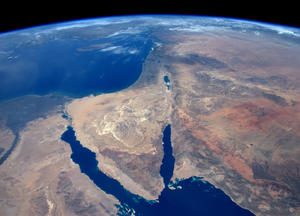Principles for Programming on the Israeli-Palestinian Conflict
[Approved by the Institute Board of Directors, January 30, 2011]

The ongoing conflict between Israelis and Palestinians (and neighboring states) is arguably the most intractable and complex dispute in the world. Conversations about it regularly invoke highly charged terms such as survival, catastrophe, genocide, apartheid, antisemitism and racism. Even in interfaith dialogues that have been underway for decades, talking about the conflict risks generating only angry exchanges.
Saint Joseph's University's fundamental goals include the pursuit of truth, the transmission of knowledge and the development of students for the purpose of promoting the common good. In the pursuit of truth and the acquisition of new knowledge, the University examines reality from a wide range of perspectives. The responsible consideration of diverse perspectives requires us always to strive for presentations that fairly present the different sides of an issue, that acknowledge the weaknesses of an argument, wherever appropriate, and that invite genuine dialogue.
As an institute, Saint Joseph's Institute for Jewish-Catholic Relations (IJCR) is committed "to increase knowledge and deepen understanding between the Jewish and Catholic communities," and by extension among all religious traditions. As an institute in a Catholic university, the IJCR affirms, in the words of the Vatican's "Notes on the Correct Way to Present Jews and Judaism in Preaching and Teaching in the Roman Catholic Church" (1985), that "Christians are invited to understand [Jewish] religious attachment [to the Land of Israel] which finds its roots in Biblical tradition, without however making their own any particular religious interpretation of this relationship. The existence of the State of Israel and its political options should be envisaged not in a perspective which is in itself religious, but in reference to the common principles of international law. The permanence of Israel (while so many ancient peoples have disappeared without trace) is a historic fact and a sign to be interpreted within God's design" [VI,25].
Hence, in keeping with the mission and fundamental values of Saint Joseph's University and the Institute for Jewish-Catholic Relations, we establish these principles for Institute programming on the Israeli-Palestinian Conflict:
1. The Bible and Today's World
- Literalist (or “fundamentalistic”) applications of biblical land promises to today’s world are contrary to contemporary Catholic and critical norms for scriptural interpretation and should be avoided.
- Respect must be paid to Jewish self-understanding of the fundamental unity of faith, land and people as part of Judaism’s ongoing covenantal life with God.
- Legal questions about the rights of Israelis and Palestinians must rest on principles of applicable law.
- There are unresolved tensions among the above points. Catholics and Jews in different ways both struggle with the meaning of biblical land passages in the vastly different society and history of the Middle East today.
2. Multiple Narratives
Israelis and Palestinians both have known suffering in their communal experiences, and they continue to suffer. They each have sets of contrasting narratives about the past century that need to be mutually and externally appreciated. Proposals for some action or policy that serve to increase deep-seated fears (e.g., for Israeli Jews' survival, for Palestinians' loss of self-determination) are unhelpful and counterproductive.
3. History
Thoroughness and objectivity that respects the rights and hurts, fears and needs of all parties should inform historical presentations of the conflict. Historical treatments must acknowledge (among other things) the influence of the superpowers involved in the First and Second World Wars and the Cold War, the Shoah, the roles of neighboring states, accuracy concerning the events of 1947-1948 and the dislocation of various peoples, the several Arab-Israeli wars, Arab pan-nationalism, politics and corruption within the disparate states and entities, and the polemical use of antisemitism and Islamophobia.
4. Local Yet International
Wide-ranging factors that influence the resolution of the conflict should be recognized. These include the roles of ethnic and national diaspora communities, and the appeals that different regional religious communities make to their coreligionists elsewhere in the world, the contrasting and competing forms of government in the region, and the differing histories of Judaism, Christianity, and Islam in the West and in the East.
5. Recognizing Limits
People in other countries concerned about the conflict should recognize the limits of their knowledge and influence. It is the people who live in the region who ultimately must resolve the dispute and make decisions about how to live side-by-side in peace and security.
6. Dialogues
Conversations about the conflict should keep in view its ongoing tragedy, as well as the promise of its eventual resolution. The present situation distorts or destroys the lives of all involved parties and inhibits the growth of the enormous positive potential of the region. Empathy with the other is crucial to the conflict’s resolution but also to interfaith dialogues about it. Highly charged terms or sweeping accusations tend not to promote understanding but hostility. As the International Council of Christians and Jews pleaded in August 2010, “Let Us Have Mercy Upon Words.” (See also the ICCJ's "Twelve Points of Berlin," §§ 4,7.)